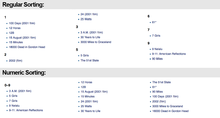Handbuch:$wgCategoryCollation
| Kategorien: $wgCategoryCollation | |
|---|---|
| What collation categories use to sort with |
|
| Eingeführt in Version: | 1.17.0 (r72308) |
| Entfernt in Version: | Weiterhin vorhanden |
| Erlaubte Werte: | (Zeichenkette) |
| Standardwert: | 'uppercase' |
| Andere Einstellungen: Alphabetisch | Nach Funktion | |
Details
As an example, to use the Spanish collation, you'd write $wgCategoryCollation = 'uca-es'; in LocalSettings.php and then run updateCollation.php for your change to take effect.
Aktuell werden unterstützt:
| Collation algorithm | MW-Version | Beschreibung |
|---|---|---|
uppercase
|
default | make everything uppercase, then sort by binary value of string when stored as UTF-8. Essentially case-insensitive sort by code point. |
numeric
|
MW 1.28+ | Same as uppercase, but with numeric sorting.
|
identity
|
MW 1.18+ | sort by binary value of string when stored as UTF-8 (without converting to uppercase). Essentially sort by code point. |
uca-default
|
MW 1.17+ | Unicode collation algorithm – complex, much more multilingual-friendly category collation. |
uca-default-u-kn
|
MW 1.28+ | uca-default with numeric sorting.
|
uca-<langcode>
|
MW 1.21+ | uca-default with language-specific adjustments. Siehe unten.
|
uca-<langcode>-u-kn
|
MW 1.28+ | uca-<langcode> with numeric sorting.
|
xx-uca-ckb
|
MW 1.23+ | Zentralkurdisch |
xx-uca-et
|
MW 1.24-1.31 (entfernt in 1.32) | Estonian but with W and V being considered separate letters. |
xx-uca-fa
|
MW 1.30-1.31 (entfernt in 1.32) | Persisch |
uppercase-ab
|
MW 1.31+ | Abchasisch |
uppercase-ba
|
MW 1.30+ | Baschkirisch |
uppercase-se
|
MW 1.31 (entfernt in 1.32) | Nordsamisch |
Since MediaWiki 1.18, extensions can add extra collations via the Collation::factory hook.
The value is also stored inside the categorylinks table to determine which rows need updating when the collation algorithm changes.
Setup instructions
- After changing this option, you must run updateCollation.php to recompute sort keys for all pages, or your categories will be sorted inconsistently.
- Updating collations is slow and may take several hours on large wikis.
uca-default/uca-xxcollations require the PHP intl extension.
- If you are using Varnish, Squid or file cache, you may have to purge category pages after running updateCollation.php to see the results.
- If you update or recompile your version of PHP, you must run updateCollation.php --force.
Language-specific collations
MediaWiki also supports many collations designed for specific languages.
These are based on the Unicode collation algorithm (UCA) uca-default and have the same requirements; they are named
uca-<langcode>, where <langcode> is one of:
af, am, ar, as, ast, az, be, be-tarask, bg, bn, bn@collation=traditional, bo, br, bs, bs-Cyrl, ca, chr, co, cs, cy, da, de, de-AT@collation=phonebook, dsb, ee, el, en, eo, es, et, eu, fa, fi, fil, fo, fr, fr-CA, fur, fy, ga, gd, gl, gu, ha, haw, he, hi, hr, hsb, hu, hy, id, ig, is, it, ka, kk, kl, km, kn, kok, ku, ky, la, lb, lkt, ln, lo, lt, lv, mk, ml, mn, mo, mr, ms, mt, nb, ne, nl, nn, no, oc, om, or, pa, pl, pt, rm, ro, ru, rup, sco, se, si, sk, sl, smn, sq, sr, sr-Latn, sv, sv@collation=standard, sw, ta, te, th, tk, tl, to, tr, tt, uk, uz, vi, vo, yi, yo, zu
For example, to use a collation for Spanish, one would use the uca-es collation.
Using these collations provides both correct sorting order for given language and proper headings for first letters of article titles. Earlier versions of MediaWiki might not support all of these language codes.
Getting new collations added
There are two parts to having a new language supported:
- It being supported by the International Components for Unicode library (the list of language codes it supports is available at [1]).
Note, however, that Wikimedia's production servers do not use the latest version of the ICU library. As of 2016, they use version 52.1, which supports a significantly smaller set of languages.
- It being additionally supported by MediaWiki itself (this basically requires listing the additional characters, or character groups, that are considered separate letters in the given language, in addition to the basic alphabet) – the always up-to-date list of currently supported ones is available at includes/collation/IcuCollation.php.
It might also be the case that the default ICU ordering ('uca-default' collation) orders the titles correctly, but does not correctly separate the letters – it can be used for the first step in that case.
Sometimes the letter ordering of a different language might fit yours, if they are related – a custom collation can sometimes be provided in such case (there is one for Sorani Kurdish / Central Kurdish language ('ckb') already, called xx-uca-ckb includes/collation/Collation.php).
Numeric sorting

Under numeric sorting, pages will be sorted as such: 1, 2, 9, 10, 11, 20, 21, 99, 100. Under regular (non-numeric) sorting, pages will be sorted as text: 1, 10, 100, 11, 2, 20, 21, 9, 99. If numeric sorting is used, all pages starting with a number will be sorted together under a single header: "0–9". If regular sorting is used, pages starting with a number will be sorted under separate headers for whichever number each title begins with: "0", "1", "2", etc. For more information about numeric sorting, see the Unicode Technical Standard #10. To test numeric sorting, see the ICU Collation Demo. Note that numeric sorting only works for unbroken sequences of digits. Digits separated by commas, periods, or spaces are treated as separate numbers.
Siehe auch
- MediaWiki 1.17/Category sorting - release notes about this feature from MediaWiki 1.17.
Externe Links
References
- ↑ Collation refers to how data is sorted according to its set of characters, applying defined sorts criterias (i.e. alphabetic or reverse sort, case dependent or not, etc.)
